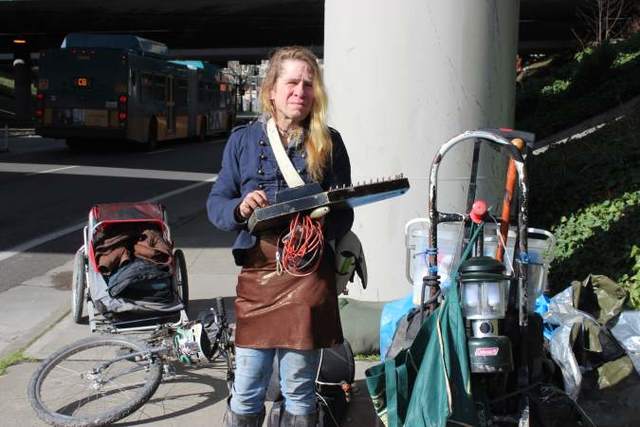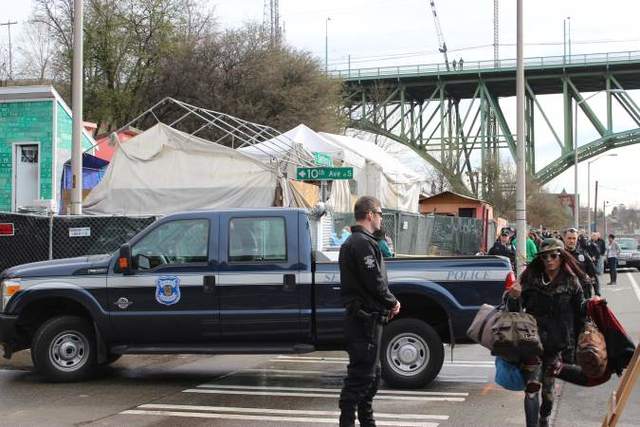Seattle’s homeless crisis took a dramatic—if not entirely unexpected—turn Friday morning as police cleared the former Nickelsville encampment site on Dearborn at the request of the church and service organization that had until recently sponsored the tent city.
Standing in red-heart pajamas that she said spoke to the surprise nature of the clearing, encampment resident Cecila Sarey stood before a clutch of news cameras and railed against Low Income Housing Institute executive director Sharon Lee and the ousted Nickelsville leader Scott Morrow.
“They had the city convinced everyone here was on drugs and wielding machetes,” Sarey said while standing across a small side street from the encampment. “That’s bull!”
Residents of the encampment were served an eviction notice three weeks ago after they voted to remove Morrow as director of the camp; at the time, Lee said the vote was a direct result of Morrow’s strong enforcement of Nickelsville’s no-drug policy.
“Frankly, one of the reasons people don’t like Scott is…he’s also an enforcer” against drug use, she told Seattle Weekly. “There’s this power struggle going on where it’s likely…that a person who is using drugs or selling drugs can be in a leadership position … Scott is seen as the person who enforces the rules, and some people don’t like that.”
In a press release Friday, the City of Seattle released data on the sweep: 16 residents were removed from the encampment; 14 residents had left the encampment prior to the eviction; and eight of the evicted residents accepted an invitation to alternative shelter.
Residents who opposed Morrow said he ran the camp like a dictatorship, a charge that has long followed the man who has been called by some the Godfather of Seattle’s homeless.
As police cordoned off the site and residents streamed out carrying sleeping bags and guitars, tension between homeless and their service providers was in full view. Sarey repeatedly accused LIHI of enriching itself with city homeless dollars while leaving those they were supposed to suffer.
“They are OK sweeping people out of their homes,” she told reporters.
When Lee was seen outside the encampment, Sarey began to heckle her. Lee did not respond and walked toward the camp swarmed with police.
“You see? They’re the ones with the money to buy the police,” Sarey said.
Nearby, Stephan McKnight, a transgender woman who says she moved to Seattle about a year ago, strummed a few chords on an autoharp.
She said she’d moved to Seattle hoping that someone would write about her and the effects drug addiction has on the homeless. She’d lived in Nickelsville about five to six months, she said, and found it to be a place she could stay clean.
“The whole place is supposed to be full of drug dealers and dope runners,” she said by way of suggesting such charges are absurd. “These people need to look in the mirror.”
Had she seen drug use in the encampment? “I’ve seen a few people drunk.”
There was a touch of the inexplicable to the scene. At one point, several people who appeared to be residents streamed out of the encampment and got into a late model sedan. McKnight said she didn’t know who they were.
In a statement released Friday, Nickesville’s leadership (as opposed to the residents resisting the eviction), said Friday’s action will allow it to collect supplies needed for a new encampment in South Seattle.
“Contrary to the outrageous statements spread through the ‘occupy camp dearborn’ Facebook page, Nickelsville has little money or resources. We had always planned to move our property from 1010 South Dearborn to our most recent encampment –Othello Village. It opened just days ago and desperately needs more Tiny Houses, Tents and Tent Platforms to expand to a capacity of 60 people or more,” the statement read.
McKnight said that residents had been informed about the Othello encampment; however, she said it was not an option for her.
“If it’s run by LIHI, I don’t want nothing to do with it,” she said. She’d rather “pitch a tent under the viaduct.”
A previous version of this post referred to the encampment cleared this morning as “Nickelsville.” However, Nickelsville was no longer operating the encampment, making that a misnomer. The post has been updated to reflect the distinction.









